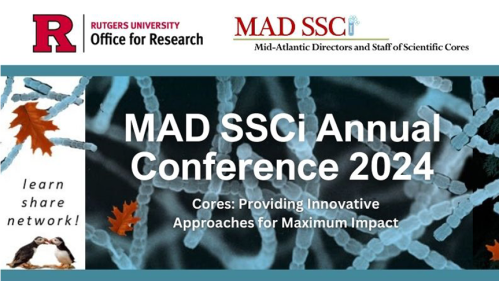Rutgers Office for Research Hosts Successful 2024 MAD SSCi Conference

Rutgers Office for Research hosted the successful 2024 Mid-Atlantic Directors and Staff of Scientific Cores (MAD SSCi) conference, which featured a keynote address from senior vice president for research Michael E. Zwick, Ph.D.
The theme of the 2024 conference was “Cores: Providing Innovative Approaches for Maximum Impact.” Zwick provided the keynote address, discussing the role core services play in building a 21st-century research university.
“Rutgers core services are integral to the collaboration between the Office for Research, government agencies, and local and worldwide research companies,” said Zwick, PhD, during his presentation. “Our facilities feature specialized laboratories with state-of-the-art equipment and are managed by scientists with the technical expertise and experience to help researchers from Rutgers and beyond advance the innovations that will change the world.”
The primary goal of MAD SSCi, a chapter of the Association of Biomolecular Resource Facilities (ABRF), is to provide networking opportunities for core directors, managers, and staff of core and research laboratory facilities involved in biomolecular technologies from scientific research centers of higher education institutions and federal government agencies in the Mid-Atlantic region, which covers New Jersey to North Carolina, and surrounding areas.
Other speakers from Rutgers included Jeetendra Eswaraka, Ph.D, vice president of Universitywide Core Services, Matthew Keller, MBA, assistant director of Business Operations and Animal Facilities, Jason Kaelber, PhD, director of the Rutgers CryoEM and Nanoimaging Facility, Vincent Smeraglia, JD, executive director of New Ventures, and Dr. Reynold Panettieri, MD, vice chancellor for Translational Medicine and Science.
The conference included tours of Rutgers core facilities, with 35 attendees visiting four of Rutgers’ 30+ specialized laboratories with state-of-the-art equipment, unique instrumentation, and shared services, managed by scientists with the technical expertise and experience.
Eswaraka and Keller discussed how data and artificial intelligence (AI) can best support of animal-care-related cores, and Kaelber talked about the Rutgers cryogenic electron microscopy (Cryo-EM) and nanoimaging facility. Smeraglia focused on building and bridging relationships between government and pharmaceutical companies through and for core facilities, and Dr. Panettieri shared his experience and expertise in the use of AI in clinical trials and data analytics.
“We appreciate the opportunity to host the 2024 Mid-Atlantic Directors Staff of Scientific Cores conference for the first time,” said Eswaraka, a member of the MAD SSCi 2024 Organizing Committee. “The event brings together administrators from across the mid-Atlantic to share their experiences and best practices as we all strive to improve and enhance the services offered by core facilities.”
“ABRF greatly appreciates the leadership and support from Rutgers University as the host of the 2024 MAD SSCi Annual Meeting,” said Ken Schoppmann, ABRF executive director. “ABRF regional Chapter meetings offer valuable opportunities for members to connect with their colleagues to learn more about the latest developments in Core facilities technology and leadership. This year’s MAD SSCI meeting included programming for Core personnel in varied roles, including Best Practices in Management Animal Related Cores, Cores as Force Multipliers for Research, and Cryo EM Regional Collaborations, along with guided tours of several Core facilities at Rutgers.”
ABRF promotes education and career advancement for core facilities professionals through its chapters, including MAD SSCi. The chapters organize meetings to discuss issues related to core management and their technologies, while also providing opportunities for core staff to network and obtain training and/or advanced technical information in a regional setting



